 ReConnect Africa is a unique website and online magazine for the African professional in the Diaspora. Packed with
essential information about careers, business and jobs, ReConnect Africa keeps you connected to the best of Africa.
ReConnect Africa is a unique website and online magazine for the African professional in the Diaspora. Packed with
essential information about careers, business and jobs, ReConnect Africa keeps you connected to the best of Africa.



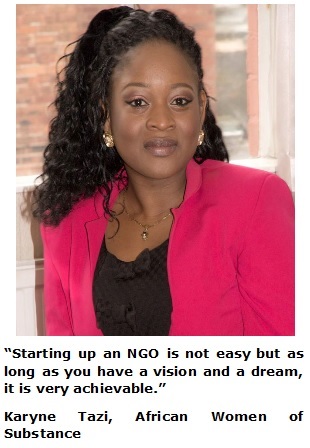 African Women of substance (AWS) is a registered UK charity that provides services, develops programs, empowers and advocates for women and girls of the African Diaspora and their communities.
African Women of substance (AWS) is a registered UK charity that provides services, develops programs, empowers and advocates for women and girls of the African Diaspora and their communities.
ReConnect Africa spoke to Karyne Tazi about the organisation and how it is helping facilitate the integration of African women into the community whilst empowering them to reach and achieve their full potential.
ReConnect Africa (RCA): What was the inspiration behind setting up African Women of Substance and what is your role in the organisation?
Karyne Tazi: African Women of Substance was initially started in 2006 with a group of friends who came together socially once a month to share their experiences and support each other. There was no other place at the time which offered the opportunity to meet new people, make friends, practice conversational English, discuss concerns and share advice about various issues pertinent to our community. We became a registered charity in 2009 when we saw that there were many other women out there who could benefit from the support and services we provided.
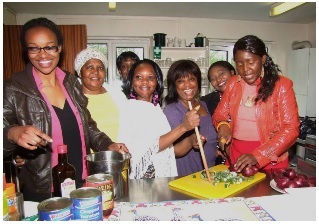 I am the Chair and Project Coordinator of the organisation. My role as Project Coordinator involves a variety of duties such as providing a wide range of administrative and organisational support particularly in the recruitment, training and support of a team of staff and volunteers, assisting with the promotion of the service and participating in various events, such as training courses, information and promotional events. I also provide support in identifying sources of income and “in-kind” donations both within the charity’s immediate community and throughout the UK; delivering quality communication with grant giving bodies, including formal applications, written reports, documents, proposals, face-to-face presentations and a lot more. My role also involves working with Trustees, governance, project evaluation, and developing and monitoring budgets, among many other duties.
I am the Chair and Project Coordinator of the organisation. My role as Project Coordinator involves a variety of duties such as providing a wide range of administrative and organisational support particularly in the recruitment, training and support of a team of staff and volunteers, assisting with the promotion of the service and participating in various events, such as training courses, information and promotional events. I also provide support in identifying sources of income and “in-kind” donations both within the charity’s immediate community and throughout the UK; delivering quality communication with grant giving bodies, including formal applications, written reports, documents, proposals, face-to-face presentations and a lot more. My role also involves working with Trustees, governance, project evaluation, and developing and monitoring budgets, among many other duties.
RCA: What do you see as the key factors behind the marginalisation of women and girls of African origin in the UK?
Karyne Tazi: African women and girls in the UK often experience the combined effects of racism and gender discrimination. Women’s experiences of domestic violence, immigration, educational systems and the criminal justice system perpetuate the multiple disadvantages that these women face. I know that there has been a lot of talk about how long women have been fighting for their rights, and we have to acknowledge that there has been significant progress. However, we still have a long way to go.
Insecure immigration status, poverty, involvement in prostitution, child rearing duties, lack of skills and education, unemployment, mental health issues or long- term illness as well as conditions such as diabetes, high blood pressure, HIV and AIDS, and lots more, are all highly problematic issues facing African women in the UK. Many women often cannot leave home because of cultural or language barriers, economic inactivity, loneliness and social isolation. These experiences can have a negative effect on self-esteem, lead to withdrawal, feelings of anxiety and depression and a sense of confusion about one’s identity. Some women and girls have also reported bad experiences and a lack of confidence in dealing with statutory organisations.
RCA: How does the organisation operate and what kind of programmes or projects are you undertaking?
Karyne Tazi: In recent years, AWS has become a household name in the African community in Wolverhampton and the West Midlands but our members are city and nationwide. We take pride in bringing African women together to share, empower, inspire, motivate and achieve, whilst delivering much needed projects in disadvantaged areas.
The governance of African Women of Substance is entrusted to six Executive Committee Members. The Board is composed of African women with varying skills and experiences in areas of Social work, Refugee Studies, Advice and Guidance, Teaching and Accounting.
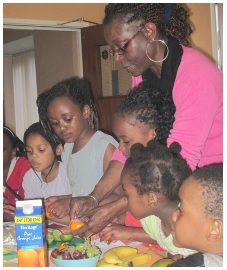 On a day-to-day basis AWS staff and volunteers meet and greet members and service users, make them aware of new services and projects, keep confidence levels of members high and maintain a warm welcoming ambience in service provision. We signpost members to services that are out of our remit and this requires AWS to establish key partnerships with organisations.
On a day-to-day basis AWS staff and volunteers meet and greet members and service users, make them aware of new services and projects, keep confidence levels of members high and maintain a warm welcoming ambience in service provision. We signpost members to services that are out of our remit and this requires AWS to establish key partnerships with organisations.
These partnerships result in AWS receiving new referrals weekly of vulnerable women needing our support and it helps us effectively refer women who are confident to access further services. We work in partnership with many public sector bodies, charities and community groups, and are funded and supported by a range of individuals and organisations.
Some of the programs we run are: A Women’s Befriending Project, Every Woman’s Chat group for Women of All Ethnicities, A Women’s Healthy Living project, African Women Achiever’s Awards, AWS Cooking Sessions, community sports projects, young people's empowerment workshops, a creative writing project, a young people’s talent club, drop-in centre advice sessions, one-to-one practical advice/support, job search support, training, seminars, workshops, general support and outreach activities.
RCA: What do you believe to be some of the barriers for Africans in the diaspora trying to connect with UK culture?
Karyne Tazi: 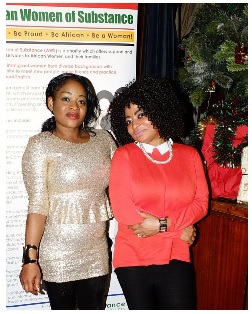 Acculturation is not an easy process. It takes time for Africans who move to live in the UK, sometimes a number of years, to start connecting with UK culture. And even after living in the UK for many years, many Africans will take bits and bobs from both the UK and African cultures to redefine their personal culture. This cherry–picking of various aspects from both cultures can often lead to serious issues and family breakdowns.
Acculturation is not an easy process. It takes time for Africans who move to live in the UK, sometimes a number of years, to start connecting with UK culture. And even after living in the UK for many years, many Africans will take bits and bobs from both the UK and African cultures to redefine their personal culture. This cherry–picking of various aspects from both cultures can often lead to serious issues and family breakdowns.
I will give you a common example; gender roles and expectations in African families differ from those that are widely accepted in the UK. Exposure to British social values which are supportive of the rights of women can lead to many women and girls challenging traditional gender roles. At the same time, for some men who are used to being seen as the “head” of the family, this challenge may be seen as particularly threatening to their status and may be heightened by their own difficulties in adjusting to a different culture. This can lead to conflict within the family and increase the risk of domestic violence and family breakdown, which has been plaguing our communities.
There have been discussions around respecting both cultures, with the knowledge that there are positives and negatives of both cultures, and thus avoiding the possibilities of looking at the UK culture as being superior to the African culture. However, as Africans in the diaspora, we need to look at our cultures and practices to ensure that the ones we keep are not physically, emotionally or psychologically harmful.
RCA: How does the organisation sustain itself and what are your plans for growth?
Karyne Tazi: The main funding sources for the charity are grants and donations from individuals, voluntary groups, public sector bodies, trusts and foundations, membership and registration fees and fundraising events.
This year, we are looking to build and increase our capacity, strengthen our systems, as well as develop more diverse funding bases and streams to support and increase the impact of our projects. We are also looking to extend our reach to meet the most vulnerable and disadvantaged women and their families at their point of need. My sincere wish is that by the end of this year, we should be the first point of call when a member of our community is in need.
RCA: What have you found to be the challenges of setting up a non-Governmental organisation and what advice would you have wished for when you first started?
Karyne Tazi: Starting up an NGO is not easy but as long as you have a vision and a dream, it is very achievable. NGOs face the same challenges that any new business would face such as lack of sufficient funds and therefore a lack of capacity and skills. Most people working on NGOs also have full-time or part-time jobs. Therefore, it becomes difficult to provide the much needed support.
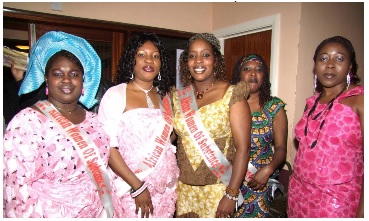 I would have liked for someone to highlight the fact that an NGO is more like a business and even more because even after providing services, you still have the tasks of making evaluations, reporting on what worked and what didn’t work, providing case reports and so much more to both funders and regulators.
I would have liked for someone to highlight the fact that an NGO is more like a business and even more because even after providing services, you still have the tasks of making evaluations, reporting on what worked and what didn’t work, providing case reports and so much more to both funders and regulators.
You also have to make business plans as well as look at sustainability issues from day one. Therefore, you have to increase your knowledge in business management.
The positive aspect of this is that you are meeting the needs of people who would not have been able to access these services if they were chargeable, and that alone gives you the reason to keep at it. For me, going to bed with the knowledge that I managed to put a smile on someone’s face or that I am a part of the solution to their problem gives me so much fulfilment.
RCA: How can people support the work of AWOS?
Karyne Tazi: There are many ways that anyone can get involved. People could write to us, contact us via phone or e-mail to discuss the best way to support our work. Some of the ways to get involved are: to volunteer for us, to provide sessional professional services to us, make a financial donation, donate gifts in kind or participate in one of our events.
All these are explained in details on our website which is www.awos.org.uk
